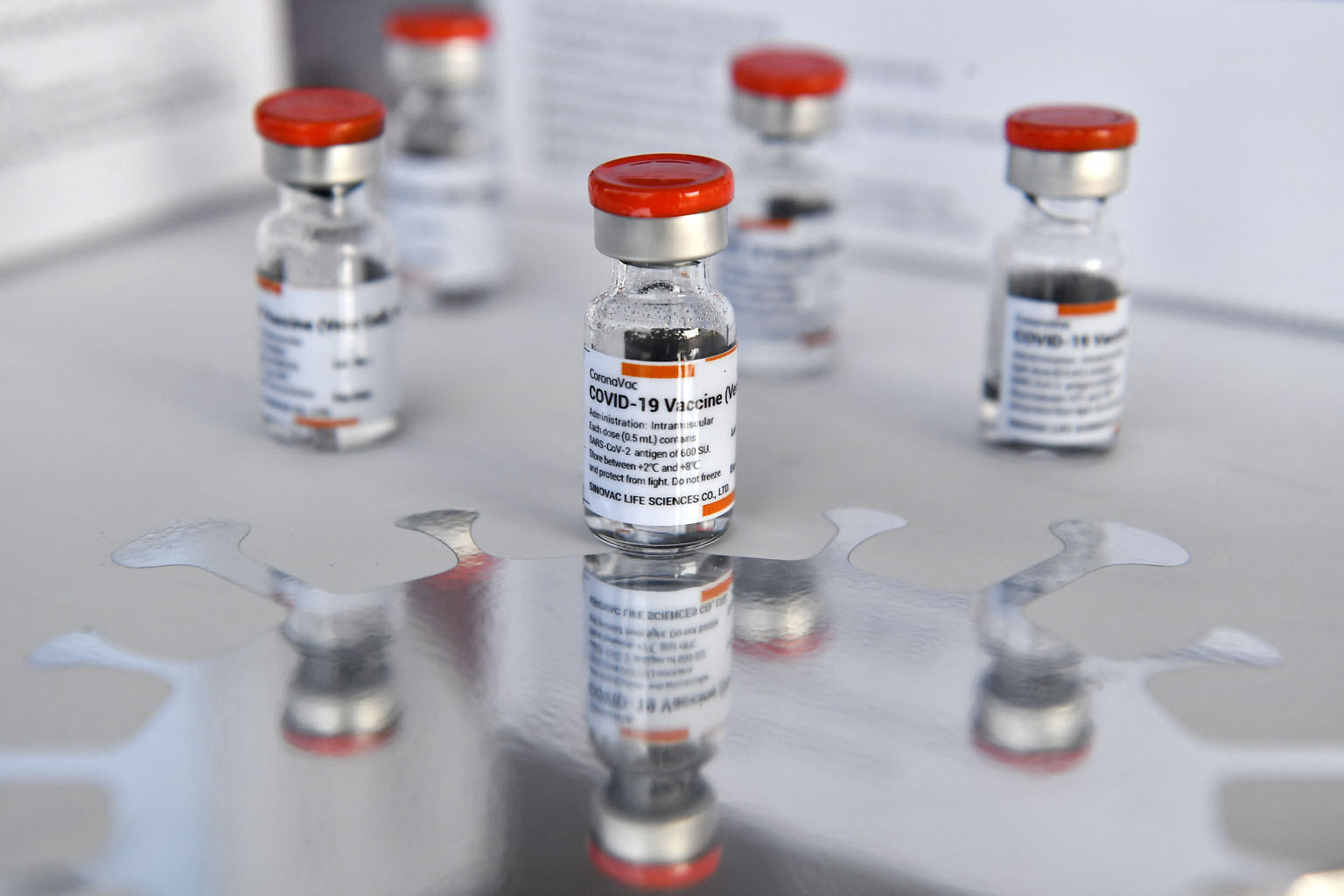Coronavirus Vaccines
Private clinics to offer Sinovac jab free for those who need it
Sign up now: Get ST's newsletters delivered to your inbox

The Ministry of Health said yesterday that about 20 private medical centres here will be selected to be licensed providers of the Sinovac vaccine.
PHOTO: AGENCE FRANCE-PRESSE
People who were unable to get the Pfizer-BioNTech and Moderna vaccines due to allergies will be able take the Sinovac vaccine for free at private clinics under the Special Access Route (SAR).
The Ministry of Health (MOH) yesterday said about 20 private medical centres here will be selected to be licensed providers of the China-made vaccine.
About 200,000 doses had arrived here in February. These will be released for free to the providers, which will be allowed to charge a fee to cover their costs.
MOH said the Government will reimburse this fee to any of the 34,000 individuals who were allergic to or previously rejected from taking mRNA vaccines if they decide to opt for the Sinovac jab.
Private healthcare institutions that wish to apply to provide the Sinovac vaccine must do so by noon on June 11.
Responding to calls from some quarters for the Health Sciences Authority (HSA) to approve the Sinovac vaccine as part of the national vaccination programme, given that the World Health Organisation (WHO) has approved it for emergency use, MOH said the WHO list focuses on the needs of low-and middle-income countries with limited access to Covid-19 vaccines.
"It is a risk-based process that expedites the assessment of vaccines for use in a pandemic especially in these countries, where the benefits are deemed to outweigh the risks, despite uncertainties about the safety and efficacy of the vaccine," MOH added.
There are currently six vaccines on the WHO emergency-use list: Those from Moderna, Pfizer-BioNTech, Johnson & Johnson, AstraZeneca, Sinopharm and Sinovac.
Only vaccines on the list can be brought in under the HSA's SAR, which is an existing process to bring in unregistered medicines to address unmet medical needs.
MOH noted that many developed jurisdictions, including Singapore, typically conduct further rigorous evaluations before approving a vaccine. It reiterated that HSA evaluates all applications based on the same standards and requirements, and is still awaiting outstanding data from Sinovac.
Both the Pfizer and Moderna vaccines use mRNA technology to give instructions to the body's cells to produce a harmless piece of the spike protein found on the surface of the coronavirus that causes Covid-19. This allows the body to protect itself from the disease.
Sinovac uses more traditional vaccine technology where an inactivated form of the coronavirus - a "killed virus" - teaches the body to protect itself from Covid-19.
In Singapore, those calling for the Sinovac vaccine's inclusion in the national vaccination programme include Progress Singapore Party secretary-general Francis Yuen.
In a Facebook post on Thursday, he said all viable vaccines - like Sinovac's - should be used to combat the pandemic. This could supplement any shortfall in supplies from Pfizer-BioNTech and Moderna, thus speeding up the pace of vaccinations, he added.
In a Forum letter published in The Straits Times yesterday, a reader also called for a less ambivalent stance on alternative Covid-19 vaccines so that people who are not eligible for mRNA vaccines can make a more informed decision on whether to take alternative vaccines or not be vaccinated at all.
Professor Teo Yik Ying, dean of the National University of Singapore's Saw Swee Hock School of Public Health, said allowing the Sinovac jab through the private healthcare sector gives people the option to get it without compromising on standards set by Singapore.
"We want to ensure not just safety but maximum effectiveness when our people are vaccinated. That means we want to be very clear about the efficacy data for the vaccines that we roll out nationally," he said.
While the Sinovac vaccine meets the WHO's criteria of being safe and having an efficacy of at least 50 per cent, data published so far has shown that the jab has a divergent range of efficacy rates, from just over 50 per cent to about 90 per cent, Prof Teo noted.
In contrast, both the Pfizer-BioNTech and Moderna vaccines have consistently shown an effectiveness rate of more than 90 per cent.
University of Hong Kong molecular virologist and professor Dongyan Jin told The Wall Street Journal that WHO's approval of Sinovac's jab would speak more to the need for additional vaccines rather than represent a vote of confidence. Questions about the reliability of some of Sinovac's earlier clinical data remain, given a lack of details from the firm and researchers for the trial, he added.
MOH said that while the Government will facilitate arrangements to take the Sinovac vaccine through licensed providers, this is ultimately a private arrangement.
The ministry said it will draw up guidelines on proper counselling, informed consent and the safe management of patients. However, the Sinovac jab cannot be covered by the Vaccine Injury Financial Assistance Programme as it is still unregistered, it added.
MOH said: "Individuals who wish to receive vaccination under SAR should discuss with their doctor in these appointed providers the risks and benefits of using these vaccines, and jointly make an informed decision."


